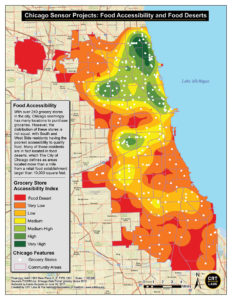Food Insecurity
How it’s affecting our children’s health
by Guest blogger: Laurie Ouding, RN
Listen to her podcast HERE
Chicago’s population of 2.7 million consists of numerous neighborhoods, varying greatly in income levels and subsequently, the health of its citizens within those neighborhoods. Food inequity in areas often referred to as food deserts, bring a plethora of health related issues to these already impoverished, struggling neighborhoods. There have been numerous studies showing a decreased life expectancy by as many as 16 years when compared to more affluent neighborhoods where food inequity, healthcare access and housing are not as much of an issue. The most vulnerable populations, children, seniors and those with chronic disease, see the largest detrimental impact on their health.
A noticeable difference
 In my experience as a nurse for 33 years, focused on pediatrics, I have worked in both rural hospitals in Michigan and an inner city hospital in the heart of Chicago. There is a distinct difference in the patients admitted regarding the types of and levels of poor nutrition related illnesses. In the more rural setting there was greater access to healthy, locally grown foods with large, well established farmer’s markets carrying produce and other products in a wide range of prices. This resulted in access to people of all socioeconomic levels and less hospital admissions for nutrition related illnesses. Whereas, in larger cities like Chicago, there are pockets of impoverished neighborhoods where there is a lack of not only farmer’s markets, but grocery stores as well. In those neighborhoods there are typically small corner stores with no fresh or healthy foods, where you can buy junk food and soda very inexpensively. The results of the areas of food inequity are evident by the increasing number of children admitted to the hospital with illnesses directly related to poor nutrition. Illness such as obesity with malnutrition, diabetes in very young children and severe, chronic constipation requiring invasive treatment, often returning a month or two later despite in hospital education.
In my experience as a nurse for 33 years, focused on pediatrics, I have worked in both rural hospitals in Michigan and an inner city hospital in the heart of Chicago. There is a distinct difference in the patients admitted regarding the types of and levels of poor nutrition related illnesses. In the more rural setting there was greater access to healthy, locally grown foods with large, well established farmer’s markets carrying produce and other products in a wide range of prices. This resulted in access to people of all socioeconomic levels and less hospital admissions for nutrition related illnesses. Whereas, in larger cities like Chicago, there are pockets of impoverished neighborhoods where there is a lack of not only farmer’s markets, but grocery stores as well. In those neighborhoods there are typically small corner stores with no fresh or healthy foods, where you can buy junk food and soda very inexpensively. The results of the areas of food inequity are evident by the increasing number of children admitted to the hospital with illnesses directly related to poor nutrition. Illness such as obesity with malnutrition, diabetes in very young children and severe, chronic constipation requiring invasive treatment, often returning a month or two later despite in hospital education.
Solutions through empowerment
There are solutions to these issues and poor health outcomes. The solutions must address not only access to affordable, locally grown foods but also the necessary education in both nutrition and culinary areas. We need to teach people to grow their own food no matter where they live, understand basic nutrition and learn how to cook healthy food simply, addressing different cultures.
In empowering people of all socioeconomic levels to have more control over their food throughout it’s cycle, we are giving them the tools to improve their health and recognize the importance of food as medicine, the key to improved health outcomes. Though there are many issues affecting health outcomes such as lack of jobs or low paying jobs, lack of health care access, transportation issues and not enough affordable housing options, addressing food inequity is essential. By bringing creative solutions to the local food system we can create not only better access to healthy, locally grown affordable foods, but also jobs, education, and a means to bring communities together.
A call to action
Cities need improved urban agriculture policies to strengthen the local food economy, thus improving the health of its citizens. Technologically advanced greenhouses and indoor growing systems exist and offer the opportunity for food systems to become more localized, providing higher quality, densely nutritious food. Vacant lots could become orchards, sunflower fields that remediate the soil or community gardens feeding its neighbors. Local banks, philanthropists, funders, developers, city programs, etc., should be putting their money where their mouths are…..literally.
About this author:
 Laurie is an RN currently working at Rush University Medical Center as a pediatric nurse. She was raised in rural Michigan where she spent much of her life working in cultivation of gardens, raising her three daughters and active in volunteer organizations and nursing.
Laurie is an RN currently working at Rush University Medical Center as a pediatric nurse. She was raised in rural Michigan where she spent much of her life working in cultivation of gardens, raising her three daughters and active in volunteer organizations and nursing.
Working with local community organizations, she is moving toward opening an indoor, year-round farmers market, greenhouse with vertical hydroponics, and a spirulina farm. Her south side Chicago project will employ commercial kitchen facilities to provide inner city communities a path back to prosperity through self-enabled, local food industries.
How to reach Laurie:
Website: www.foodmatters.life
Email: info@foodmatters.life
*Disclosure:
Some of the links in our podcast show notes and blog posts are affiliate links and if you go through them to make a purchase, we will earn a nominal commission at no cost to you. We offer links to items recommended by our podcast guests and guest writers as a service to our audience and these items are not selected because of the commission we receive from your purchases. We know the decision is yours, and whether you decide to buy something is completely up to you.


